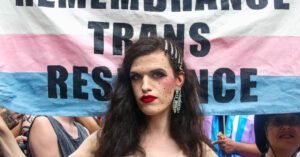Arts Council England (ACE) is an organisation that cares — and you can tell what it cares about by searching through the hundreds of documents on its website. Diversity, racism and inclusion; class and disability; the environment and the climate crisis. There are tens of thousands of words outlining the thinking that grants access to its half a billion-pound budget. If you want ACE’s money, you’d better convince it that you care about the same things, in the same way.
However, the flip-side is that there are some issues that ACE seems not to care about — like free expression. ACE now warns funded organisations that it will “monitor… artistic and creative output that might be deemed controversial” and requires them to consider “the views and perceptions of different stakeholders, including their appetite for risk”. On the next page of the guidance, there’s the threat of sanctions — from “increased monitoring” to “withdrawal of funding”. This is an object lesson in how to have a chilling effect on culture in Britain. The announcement by Culture Secretary Lucy Frazer this month of a full-scale independent review into the organisation is welcome; the Arts Council’s role in limiting artistic freedom must be examined.
The review could highlight the poor treatment of dozens of artists. In 2022, for instance, the gender-critical ceramicist Claudia Clare was invited to exhibit at ACE-funded Burgh House, Hampstead — only for her exhibition to later be cancelled. The director of Burgh House, Mark Francis, emailed Clare to explain: “We respect the rights of individuals to hold their own beliefs, but once these have been made public by an individual, we must consider all stakeholders in the charity and their rights to feel included and safe.” This is ACE’s approach to free expression in action.
While freelancers who work in the arts are often unwilling to go on the record about their experiences, for fear of losing work, Clare is far from alone. A number of programming staff at a major ACE-funded organisation recently described to me how they were investigated by its HR department after inviting a gender-critical artist to speak. Their jobs are now in doubt because they “exposed audiences to dangerous ideas”. Similarly, a dance company’s tour was cancelled in 2023 after several venues realised the production contained gender-critical feminist content. The people concerned don’t want to risk further damage to their careers by being quoted here.
The same hostility can be traced back to the Arts Council itself. In June last year, Denise Fahmy, an ACE employee of more than 15 years, won a harassment claim against the body. (She has co-founded Freedom in the Arts with choreographer Rosie Kay.) Her case related to another labyrinthine arm of bureaucracy, the London Community Fund, which had awarded an ACE grant — later suspended — to the gender-critical group LGB Alliance. After an internal meeting in which Fahmy was the only person to challenge the view that the LGB Alliance is anti-trans, colleagues circulated a petition which condemned “discriminatory transphobic staff” and claimed the LGB Alliance had links to “neo-Nazis, homophobes and Islamaphobes [sic]”. When she won the case, Fahmy said: “People in the arts, and especially women, are facing a tide of bullying with spurious accusations of transphobia… I hope my case has woken up leaders in the arts as to what’s going on.”
It’s certainly a shift from ACE’s early vision. When I first started working in the subsidised arts in 1996, ACE modestly described itself as “the key funding body for the arts”. And this was in keeping with its founding principles, dreamed up in the post-war moment of cultural democratisation. Growing out of the wartime Committee for Encouragement of Music and the Arts (CEMA), the Arts Council was established by Royal Charter in 1946 to “develop and improve knowledge, understanding and practice of the arts”, and to spread them as widely as possible throughout the country. John Maynard Keynes chaired both CEMA and the new body, and his vision of great art for everyone remained unchallenged for 60 years.
By the mid-2000s, though, something had changed. ACE had by then become “the national development agency for the arts”, and this heralded an attitudinal shift. Rather than a mere funding body, it began to see itself as the sponsor and patron of the sort of arts it wanted to see. Over time, aspirations towards artistic influence in turn morphed into activism. Last year, the body rechristened itself “the national development agency for creativity and culture”, and announced its new agenda in a 10-year plan, “Let’s Create”, which retreats further than ever from Keynes’s original principles.
Rather than its historical day-job — increasing access to dance, literature, music, theatre, and the rest — ACE now subordinates “the arts” within a grand, utopian social idea of universal creativity: “We aim to recognise and champion the creative activities and cultural experiences of every person in every town, village and city in this country.” And who could be against that? Unlike the more divisive “art”, creativity is a nice, unthreatening word. Some people aren’t into art, but being against “creativity” is like being against puppies.
Yet this dilution of ACE’s original commitment has been accompanied by the politicisation of its internal culture. The Nolan Principles (established in 1994 as an ethical code for public life) require ACE to be objective and “take decisions impartially, fairly and on merit, using the best evidence and without discrimination or bias”. But ACE’s impartiality is clearly under severe pressure from many of its own staff. Last year, for instance, ACE’s own independent Equality, Diversity and Inclusion review warned that some Arts Council staff’s perception of themselves as members of the artistic profession, rather than employees of a governmental body, was leading to a widespread failure to understand their responsibilities.
Denise Fahmy saw this first-hand in her time at the body. “The Arts Council struggles with being a mere funder,” she said, “they see their jobs as much bigger than this”. She explains how the Arts Council developed a new environmental responsibility policy, initially requiring funded organisations to supply straightforward data on fuel use to contribute to the Net Zero government policy. This was then developed into a new “investment principle”. Applicants for funding are now required to consider “how creation, programming and partnerships can help support your commitment and provoke debate”. Fahmy says: “If you’re wondering why there are so many shows about climate change, check organisations’ funding requirements. Arts organisations increasingly see themselves as activists, and the Arts Council is driving this through its funding criteria.”
I contacted ACE to ask where I might find an Arts Council policy on free expression. I spoke to a helpful ACE staffer, but he couldn’t find anything. He promised to consult colleagues “to see if anyone has any info tucked away”. In fact, it turns out that there are just two sentences about free expression in the guidance for organisations: “For the avoidance of doubt, we expect all NPOs to support freedom of expression. We see this as essential for a thriving cultural sector in this country.”
The consequences of such half-hearted support aren’t hard to glean. As the need for a government review attests, the original organisation is being pulled apart by the competing demands of political fashion, a levelling attitude to art itself, and the increasing dominance of activist staff. Ultimately, ACE isn’t just ignoring the developing crisis in artistic free expression — it appears to be actively fostering an intolerant culture. “Do not think of the Arts Council as a schoolmaster,” wrote Keynes in 1945, “the arts owe no vow of obedience” — by which he meant obedience to government. What he didn’t anticipate was that, nearly 80 years later, the Arts Council has become the schoolmaster and the disciplinarian, dishing out orthodoxies from on high.
Disclaimer
Some of the posts we share are controversial and we do not necessarily agree with them in the whole extend. Sometimes we agree with the content or part of it but we do not agree with the narration or language. Nevertheless we find them somehow interesting, valuable and/or informative or we share them, because we strongly believe in freedom of speech, free press and journalism. We strongly encourage you to have a critical approach to all the content, do your own research and analysis to build your own opinion.
We would be glad to have your feedback.
Source: UnHerd Read the original article here: https://unherd.com/



